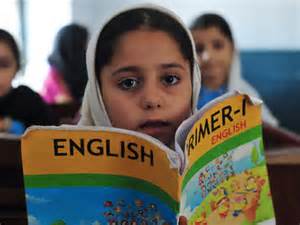INTRODUCTION
The tendency of running on education system of a particular university or board outside its own country can be traced back in the British colonial period. The countries with a history of suffering as a British colony are still accommodating the British education system in most cases though there is a recent trend of running an integrated education system combining the British and American systems. Almost all the international schools of Bangladesh follow the O level and A level courses under university of London.
The EME schools offer a completely different environment of education that shapes up a student for western culture and society. Although an education system is entitled with the great responsibility of building up a student in commensurate with the culture of his/her nation.
The Constitution of Bangladesh states in Article 17: ‘ The state shall adopt effective measures for the purpose of (a) establishing a uniform mass-oriented and universal system of education and extending free and compulsory education to all children to such stage as determined by law.’
This intended diversification of a student from his own culture and history creates a barrier between the mainstream population and him. The socialization agents and factors that the schools offer do not let a student feel in tune with the produce of two other education systems. As a result, he seeks the ideal society to settle and build up his career. The trend is more dominant in EME students than Bangla medium and madrsha students. This situation is, no doubt, alarming and deserves special attention of social scientists, educationists, politicians and the policy makers.
STATEMENT OF THE PROBLEM
The process of formal education is one of the vital sources that produce human resource for a country. In countries like Bangladesh no other sectors are consider capable enough to lessen the burden of educational process regarding the purpose.
But it is alarming that a remarkable number of English medium students leave the country either for higher education or for permanent settlement in abroad. Those who enroll in higher education in abroad generally do not return to develop their career or to render their services to the nation. They try to attain a permanent immigration in USA or in any European country and invest their professional aptitude to achieve a lucrative job. This rate of brain drain is much higher and noticeable in the case of English medium education.
This particular education system is contributing to brain-drain problem whereas English medium education should produce an educated generation to strengthen the human resource panel of country.
This situation should be addressed as a problem and the present study has been conducted to explore the nature of the problem.
OBJECTIVES OF THE STUDY
The general objectives of the study were to observe the motivation behind studying in English medium and inspiration generated among them by the education system that propels them to leave the country. The specific objectives of the present study are:
(i) To trace out the socio-economic status of the families of English medium students.
(ii) To have the respondents’ view about the condition of job market for English medium students in Bangladesh.
(iii) To assess the cultural orientation of English medium students
SCOPE OF THE TERM PAPER
(i) The study has been conducted only on ‘O’ level students studying in English medium schools in Dhaka city.
(ii) The study covers two thanas of Dhaka district i.e.
(a) Dhanmondi
(b) Gulshan
METHODOLOGY OF THE STUDY
The methodology of the study constitutes objectives and method of data collection of the study. Data and information were gathered through primary and secondary materials. Primary data were collected from the EME students and their guardians from two thanas of Dhaka i.e. Gulshan and Dhanmondi. Primary data were collected through a semi-structured questionnaire containing short checklist of a few questions. Secondary materials included newspaper articles, books and websites. Last but not the least, researchers’ own observations, views and insights were also highlighted in the course of conducting the study and report writing.
Data Collection Method
- Primary Method
- Secondary Method
Data collection tools
Primary data Collection tools
- Questionnaire
- Case Study
Secondary data collection tools
- News paper articles
- Websites
- Books
Methodology
Sample
The sample size is 30 consisting of 15 students and of English medium school and 15 guardians of Dhaka city.
Sampling Technique
The sample has been collected through non-probability sampling technique.
OPERATIONAL DEFINITION
Brain Drain: ‘Brain Drain’ means loss to a country when skilled and clever people immigrate from it to other country. The present study considers this definition in the case of English medium students and their rapidly increasing trend of seeking settlement in abroad.
English Medium Education: In the present study ‘English Medium Education’ stands for those education systems that follow the curriculum, syllabus and examination system developed by some universities or education boards around the world. Question paper, scripts and other logistic supports for secondary and higher secondary final exams are sent to those school from the concerned university or board through their nominated organizations or institutions.
The exams are organized by the caretaker organizations and the scripts are sent back to the concerned university or board for checking and marking of scripts and preparation of results are perspired by the university and are sent to countries through their representative organizations. English has been selected as the medium of instruction in these schools.
REVIEW OF LITERATURE
Tarun Chakrabarty, in his essay, ‘Bangladeshe International School’ published in an anthology of essay named ‘Bangladesher Shiksha Babostha’ in February 2002 discussed the problems and issues in brief.
1. The Motivation
After the birth of Bangladesh as an independent country a class rose who accumulated a huge amount of black money. And at the same time a trend of migration to other countries became dominant. This newly emerged class wanted their relatives and children to migrate to foreign countries. They realized that settling in abroad needs aptitude in English. Then they got inclined to English medium education.
1.1 The Shrinking Job Market
Another reason for this flow towards EME is the shrinking condition of job market in Bangladesh for EME students. The guardians know very well that the EME students have a limited option in the case of admission in public university and in the job market. Even then they send their children to EME. Because their aim is to secure a job in MNCs or to leave the country and doing ‘something’ in abroad.
1.2 The Attitudinal Change among Guardians
There has been an attitudinal change in the last two decades. The guardians are now reluctant to see their children as doctors, engineers or teachers. Better if they become entrepreneurs or secure some jobs that provides scope for being a millionaire in a shortcut way.
1.3 A Snobbish Appeal
Affording the expensive EME has created a snobbish appeal in the society. It is now an indicator of social status and pride. Sociologists hold that it an outrageous delusion for social uplifting.
1.4 The Course Curriculum
EMS follows the curriculum and syllabus designed by their mother University or board. All the books of this syllabus, except the national language book, are authored by foreign writers. These books present the references and explanations in the context of the author’s country. As a result, the students cannot match their knowledge to their surroundings and they stay ignorant about the history and culture of their own country. Finally, the syllabus fails to create patriotism and responsibility in the minds of students.
1.5 Expense of Education
The international schools are run with profit motive in private sector which is quite unjustified in the poor socio-economic condition of our country. The monthly expense for a student is beyond the ability of common people. Even the middle class cannot afford the education in some cases. Some schools motivate the guardians to donate a handsome amount to the school fund. In other words, this education is not for all but the moneyed people which are quite contrary to the stand of education.
1.6 Environment of EMS
Almost all the schools have been established in buildings constructed for living. As a result, there is no atmosphere or environment recommended for education. There is no open space, playground or open sky for the students that hamper their mental progress. The entrepreneurs also do not have any plan for giving their schools a unique character that a school is meant to have.
1.7 Cultural Practices- relation between opposite sex
From the early period of schooling they get introduced to the words `Boyfriend` and `Girlfriend` and they have been noticed to express their dormant cravings for establishing this type of relationship. The concept of love that they believe in, in their adult age is quite contrary to the beliefs and practices prevailing in Bangladeshi culture. Their belief is more akin to the word `affair` than emotion, love and sympathy.
1.7.1 Relation with teachers
Relation between teacher and student is also vulnerable here. The students are not careful to show respect to their teachers in their words or behavior. The idea that guides the students is that they are paying enough and they have the right to disobey the traditional values about teachers.
1.8 Effectiveness of EME
All the educationist and philosophers have emphasized the necessity of learning in mother tongue in the childhood. If a student does not learn in mother tongue in his childhood his ability of understanding does not develop. As a result, his ability to understand any lesson written in foreign language decreases. It is a universal truth that if he does not achieve aptitude in mother tongue he will not be able to learn foreign language properly.
LIMITATION
This study is an integral past of FTC conducted by NAEM. The researcher has to complete the study within the give period of time. In fact, a completive and flawless study requires a comprehensive arrangement of manpower, money and time. As a consequence, the obstacles that could not be avoided are as follows:
- The study has been completed within a limited span of time.
- The sample size does not represent the whole community. A larger sample size would give more dependable findings.
- Extreme scarcity of research work, Journals on certainty topic.
- Sufficient allocation of financial support could not be provided.
- Unwillingness from the end of respondents to disclose the facts has been noticed in some cases.
1. Occupation of guardians
Occupation | Frequency | Percentage |
Doctor | 2 | 13.33 |
Businessman | 6 | 40 |
Teacher | 4 | 26.66 |
Private Service/MNC | 3 | 20 |
Total | 15 | 100 |
Table 1: Percentage of Occupation of guardians
businessmen and the next highest category consists of teachers with a percentage of 26.66%. Guardians working in private sector or MNCs are 20% in percentage. Doctors are only 13.33%.
2. Monthly Income
Monthly Income | Frequency | Percentage |
| > Tk. 500,00 | 3 | 20 |
| > Tk. 100,000 | 4 | 26.66 |
| > Tk. 200,000 | 2 | 13.33 |
| Tk. 200,000+ | 6 | 40 |
| Total | 15 | 100 |
About 40% of the guardians interviewed have a monthly income of more than 200 hundred taka. Monthly income less than 100 hundred taka falls into the next category and the percentage is 26.66. 20% of the respondents said that they earn less than Tk. 500, 00 per month. Only 13.33 percent earn between. Tk. 1 lac to 2 lac per month.
3. Background of Guardians’ Education
Educational Institution | Frequency | Percentage |
| Govt. Institution | 11 | 73.33 |
| Private Institution | 3 | 20 |
| CadetCollege | 1 | 6.66 |
| Total | 15 | 100 |
About 73.33% of respondents said that they studied up to HSC level in Govt. institutions and 20% of the respondents studied in private institutions. Only 6.66% studied in CadetCollege.
4. Plan about children’s future
Settlement in Bangladesh | Frequency | Percentage |
| Yes | 3 | 20 |
| No | 12 | 80 |
| Total | 15 | 100 |
About 80% of the guardians said that they do not want their children to settle in Bangladesh. Only 20% said that they will accept if their children settles in Bangladesh.
5. Reasons behind the Intention of Leaving the Country
It was an open ended question attempted to seek out the inner motivations of the guardians about preparing their children for foreign settlement. All the respondents emphasized that there is no job security in Bangladesh. In addition, 11 (73.33%) of the respondents mentioned about political unrest. The rest 4 respondents (26.66) mentioned about lack of social security.
1.6 Education as an Indicator of Family Status
To reply this open ended question all the respondents said without confusion that affording EME is an indicator of family status.
1.7 Rationale behind choosing EMS
Table 5: Percentage of Rationale behind Choosing EMS
Rationale behind Choosing EMS | Frequency | Percentage |
| General education is not up to the mark | 8 | 53.33 |
| He/she should grow up in western culture | 2 | 13.33 |
| It will help him/her settle in abroad | 5 | 33.33 |
| Total | 15 | 100 |
About 53.33% of the respondents said that general education or Bangla medium education is not up to the mark. And 33.33% wished that EME will help their children settle in abroad. 13.33% believes that their children should grow up in western culture.
Career Planning
1.1 Preference of foreign university
Table 6: Percentage of Preference of Foreign University for Higher Education
| Foreign University for Higher Education
| Frequency | Percentage |
| Yes | 13 | 86.66 |
| No | 2 | 13.33 |
| Total | 15 | 100 |
86.66 % said that they will choose a foreign university for higher education. Only 13.33% wants to get admitted in local universities.
1.2 Willingness of Coming Back
Willingness of Coming Back
Table 7: Percentage of
Willingness of Coming Back | Frequency | Percentage |
| Yes | 5 | 38.46 |
| No | 8 | 61.53 |
| Total | 13 | 100 |
61.53% of the respondents said that they will not come back to Bangladesh for permanent settlement. Only 38.46% replied positively in this regard.
1.3 Reason behind Preference for Foreign Settlement
Table 8: Percentage of Reason behind Foreign Settlement
Reason behind Foreign Settlement | Frequency | Percentage |
| No scope for career development | 2 | 25 |
| My family wants me to settle there | 6 | 75 |
| Total | 8 | 100 |
Maximum respondent 75% said that their family wants them to settle in abroad. 25% mentioned about scarcity of prestigious job as the reason
1.4 Willingness for foreign citizenship
Table 9: Percentage of Willingness for foreign citizenship
| Willingness for foreign citizenship | Frequency | Percentage |
| Yes | 7 | 87.5 |
| No | 1 | 12.5 |
| Total | 8 | 100 |
87.5% are willing to receive foreign citizenship and 12.5 % declined the idea
1.5 Awareness of Career Scope
Table 10: Percentage of awareness of career scope in Bangladesh
| Awareness of career scope in Bangladesh | Frequency | Percentage |
| Agree | 1 | 12.5 |
| Do not agree | 2 | 25 |
| Not aware of the present situation | 5 | 62.5 |
| Total | 8 | 100 |
62.5 are not aware at all that scope for career is widening in Bangladesh. 25% of the respondents did not agree with the information. Only 12.5% agreed that the scope is widening.
1.6Awareness of Duty towards the Nation
All the participants agreed that it is their duty to serve the nation.
2. Socio-economic Status
2.1 Residence and Transportation Facility
Table 11: Percentage of Residence and Transportation Facility
| Residence/ Transportation | Yes | Percentage | No | Percentage |
| Own House | 8 | 53.33 | 7 | 46.66 |
| Vehicle | 13 | 86.66 | 2 | 13.33 |
53.33% have their own house for living and 46.66% live in rented flat. 86.66% have private vehicle for transportation and only 13.33% move in public
vehicles
2.2 Family Tour
Table 12: Percentage of Family Tour
| Family Tour | Frequency | Percentage |
| Foreign Tour | 4 | 30.76 |
| Local Tour | 6 | 46.15 |
| Both | 3 | 23.07 |
| Total | 15 | 100 |
46.15% like to have local tours and a significant number of families 30.76% go for foreign tour. Both local and foreign tours are preferred by 23.07%.
2.3 Family Party
Table 13: Percentage of Family Party
| Family Party | Frequency | Percentage |
| At home | 9 | 60 |
| At club | 4 | 26.66 |
| Not applicable | 2 | 13.33 |
| Total | 15 | 100 |
Most of the respondents 60% like to have party at home. 26.66% have said that they like to arrange club party.
3. Cultural Practices
3.1 History of Bangladesh at School
Table 14: Knowledge about history of Bangladesh
O levels students don’t have to study history of Bangladesh for exam purpose. But, in their early classes they study Bangladesh Studies where the history of Bangladesh is just an inclusion only. No in depth understanding of our history is not possible for them.
3.2 Celebration of National Days in school
All the respondents said that their schools arrange special programs on the days like Independence Day, Victory Day, Shahid dibash and Bangla Nabobarsho.
3.3 Taste of Movie
Table 14: Taste of Movie
| Movies produced in | Frequency | Percentage |
| Bangladesh | – | |
| Mumbai | 4 | 26.66 |
| Hollywood | 1 | 6.66 |
| Both Mumbai and Hollywood | 10 | 66.66 |
| Total | 15 | 100 |
The major portion 66.66% like films from Mumbai and Hollywood. No one said in favor of Bangladeshi movie.
3.4 Taste of Music
Most of the respondents i.e. 13 (86.66%) said that they like western music like pop, rock, reggae, rap and heavy metal bands. 6 (40%) among them mentioned about Hindi film songs as their favorite music. Only 2 (13.33%) of them said that they like Bangla songs.
3.5 Favorite Personality
Maximum number of respondents i.e. referred to Hazrat Muhammad, the last prophet of Islam as their favorite personality. Then comes the politicians like Nelson Mandella, Mahatma Gandhi and scientists like Einstein and Stephen Hawking.
STUDY FINDINGS
FROM GUARDIANS
- Most of the guardians are business persons and they have good amount of earning per month. Businessmen usually want their children to be businessmen. They want that their children will be fluent in English and at the same time accustomed to western world that will come to their assistance in business career. Parents of other professions have different motivations. Their plan is to help their children to settle in abroad or develop a lucrative career in Bangladesh.
- All the respondents agreed that EME is a status symbol now. It indicates their financial strength and modern lifestyle. The other side of this truth is that they are deviating from the real sense of education.
- Maximum number of guardians is from general Bangla medium education. But they do not want their children to study in Bangla medium. In their opinion, Bangla medium education is not up to the mark now. They believe that EME is the only modern education that can ensure a good future for their children in abroad.
- A significant number of guardians do not want their children to settle in Bangladesh. They think this is an overcrowded country full of political chaos and is gradually becoming a place unfit for living.
FROM STUDENTS
- Maximum number of students opted for admission in foreign universities after o levels and a good number of them are not wiling to come back to Bangladesh.
- They have clearly stated that their parents do not want them to settle in Bangladesh. Their thoughts and ideas have also been shaped this way. Also they apprehend that if they come back they will not get a respectable job.
- The situation seems even worse when almost all of them wished for foreign citizenship. It means that they want to shrug off the Bangladeshi identity. But, interesting enough they are all convinced that they should serve the nation. What reality comes out from this situation is that they are helpless in the prevailing socio-economic and political situation of our country. They do not want to risk their life.
- They are not aware at all of the job scopes that are flourishing in our country for EME students.
- All the students are from well-of families. Their socio-economic status is remarkably sound in comparison with middle class families. But, there are students who belong to middle class families. In such cases, those families are maintaining the huge cost of education anyway.
- Their cultural orientation is quite alienated from the traditional Bangladeshi culture. They like entertainment movies from Hollywood and Mumbai that, in most cases, do not offer any scope for nurturing creativity or open thinking. Bangladeshi movie whether commercial or off-track are just untouchables for them. Perhaps this is an influence of the syllabus and culture practiced in school.
- The situation does not differ much in the case of their taste of music. A very few have been found who like Bangla music.
- Most of them are found religious in thinking though not in practice. They have mentioned the name of Hazrat Muhammad as their favorite personality. Some of them referred to some foreign politicians but no one mentioned the name of any Bangladeshi mastermind.
- The students of EME are clearly alienated from their root and culture. The schooling plays the most important role here. They practice a remote, sometimes a mixed culture.
- The schools have no intention to generate nationalistic feelings in them and the students are being kept aloof by their family. From the very childhood they are taught that they should put their best effort to settle in abroad.
RECOMMENDATIONS
- The Govt. should take effective measures to design an education system for the mass that accommodates all the students irrespective of social status and financial ability.
- The Govt. should formulate special policy and monitoring guidelines for EMS.
- Necessary steps should be taken to review the curriculum of EME with special emphasis on national history and culture.
- Teaching and learning process of English as a foreign language should be revitalized in Bangla medium and madrasha education.
- Education sector must be kept free from all types of political chaos and complexities.
- Opportunity for higher education in public university should be expanded for students of all strata.
CONCLUSION
English Medium Education, in our country, is one of the three education systems. Students of the other two education systems do migrate for job and settlement. Poverty, unemployment and other socio-economic factors are active behind that. But, there is a basic difference between them. Students other than English Medium have the chance to develop their root with the mass people and common culture of Bangladesh which is one of the prime goals of education. The EME students are deprived of this opportunity. Perhaps this is one of the shortcomings of EME. The students in this education system are trained in a culture that is alien from the common people. The over conscious attitude of guardians and profit mentality of EMS play the most devouring role here. However, the Government can take steps for reviewing the curriculum and activities of EME schools.













